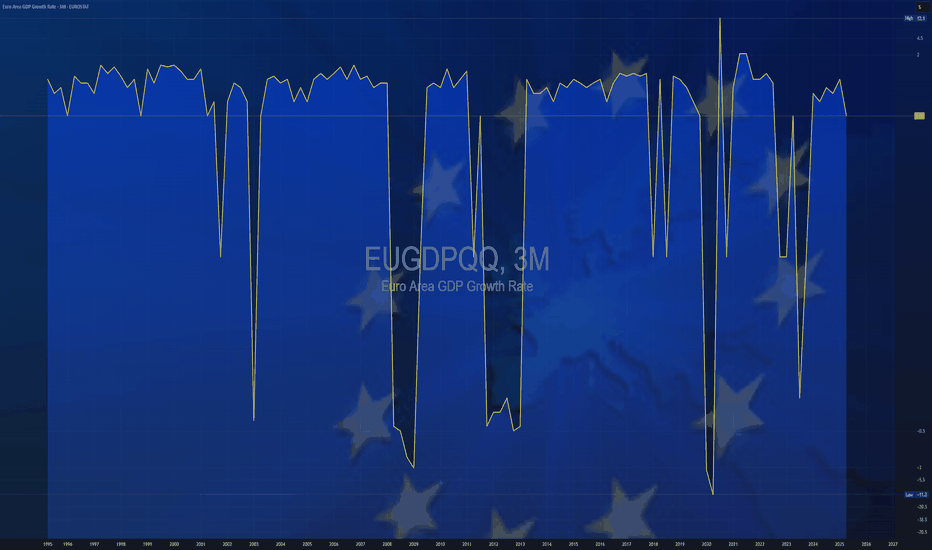$EUGDPQQ -Europe GDP (Q3/2025)ECONOMICS:EUGDPQQ
Q3/2025 +0.2%
source: EUROSTAT
- The Eurozone economy expanded by 0.2% quarter-on-quarter in Q3 2025,
up from 0.1% in Q2 and slightly above market expectations of 0.1%, according to a flash estimate.
France grew 0.5%, exceeding expectations of 0.2%, driven by a sharp rise in exports, while Spain remained the best performer among the bloc’s largest economies, expanding 0.6% as expected, supported by strong household consumption and fixed investment.
Meanwhile, Germany stagnated due to a decline in exports, and Italy stalled, with the industrial sector contracting and services showing no growth.
On an annual basis, Eurozone GDP rose 1.3%, above expectations of 1.2%.
The better-than-expected figures ease pressure on the ECB to cut interest rates in the near term, supporting the view that the economy remains resilient despite geopolitical tensions and trade policy uncertainty.
Trade ideas
$EUGDPQQ -Europe GDP (Q2/2025)ECONOMICS:EUGDPQQ
Q2/2025
source : EUROSTAT
- The Gross Domestic Product (GDP) In the Euro-Area expanded 0.10 percent in the second quarter of 2025 over the previous quarter.
GDP Growth Rate in the Euro Area averaged 0.37 percent from 1995 until 2025, reaching an all time high of 11.60 percent in the third quarter of 2020 and a record low of -11.10 percent in the second quarter of 2020.
$EUGDPQQ -Europe's GDP (Q3/2024) ECONOMICS:EUGDPQQ 0.4%
Q3/2024
source: EUROSTAT
- The Eurozone GDP expanded 0.4% on quarter in the three months to September 2024,
the strongest growth rate in two years, following a 0.2% rise in Q2 and above forecasts of 0.2%
The German economy expanded 0.2%, surprisingly avoiding a recession, after a downwardly revised 0.3% decline in Q2.
GDP growth also quickened in France (0.4% vs 0.2% in Q2) and the Spanish economy remained robust (0.8% vs 0.8%).
In addition, the Portuguese economy grew 0.2%, the same as in Q2 while the GDP in Ireland (2% vs -1%) and Austria (0.3% vs 0%) rebounded and grew faster in Lithuania (1.1% vs 0.3%).
On the other hand, the Italian economy stalled, following a 0.2% rise in Q2 and Latvia remained in contraction (-0.4% vs -0.3%). Year-on-year, the Eurozone GDP expanded 0.9%, the best performance since the Q1 2023, compared to a 0.6% rise in the previous quarter and higher than forecasts of 0.8%.
The ECB expects the GDP in the Eurozone to expand 0.8% this year.
Euro-Zone GDP Quarterly *3M (QoQ)ECONOMICS:EUGDPQQ (+0.3 %)
Q1/2024
source: EUROSTAT
The Eurozone’s economy expanded by 0.3% in the first quarter of 2024, the fastest growth rate since the third quarter of 2022, to beat market expectations of a marginal 0.1% expansion and gain traction following muted readings since the fourth quarter of 2022.
The result added leeway for the European Central Bank to refrain from cutting rates to a larger extent this year should inflationary pressures prove to be more stubborn than previously expected.
Among the currency bloc’s largest economies, both the German and the French GDPs expanded by 0.2%, while that from Italy grew by 0.3% and that from Spain expanded by 0.7%, all above market estimates.
Compared to the same quarter of the previous year ECONOMICS:EUGDPYY ,
the Eurozone’s GDP grew by 0.4%, beating market expectations of 0.2%, and gaining traction after two straight quarters of 0.1% growth.




